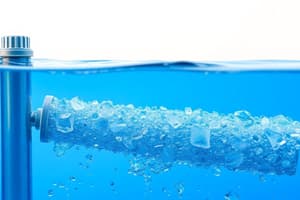Podcast
Questions and Answers
What is the definition of ultrafiltration?
What is the definition of ultrafiltration?
- Movement of water across a membrane due to a concentration gradient without the need for dialysate
- Movement of solutes across a membrane due to a concentration gradient with the need for dialysate
- Movement of water across a membrane due to a pressure gradient without the need for dialysate (correct)
- Movement of solutes across a membrane due to a pressure gradient with the need for dialysate
How do ultrafiltration and dialysis help manage blood volume and certain electrolyte concentrations?
How do ultrafiltration and dialysis help manage blood volume and certain electrolyte concentrations?
- By creating a solute concentration gradient across the membrane
- By reducing mediators that initiate a systemic inflammatory response syndrome (SIRS)
- By removing excess water and certain solutes from the blood (correct)
- By promoting capillary permeability and shifting of fluid to the extravascular space
What is the impact of hemoconcentrators on circulating concentrations of drugs and ions during CPB?
What is the impact of hemoconcentrators on circulating concentrations of drugs and ions during CPB?
- They decrease the circulating concentrations of drugs and ions
- They neutralize the circulating concentrations of drugs and ions
- They have no impact on circulating concentrations of drugs and ions
- They increase the circulating concentrations of drugs and ions (correct)
When is the use of the hemoconcentrator important in relation to CPB?
When is the use of the hemoconcentrator important in relation to CPB?
What do several studies suggest about the effect of ultrafiltration and dialysis on systemic inflammatory response syndrome (SIRS)?
What do several studies suggest about the effect of ultrafiltration and dialysis on systemic inflammatory response syndrome (SIRS)?
What promotes capillary permeability and shifting of fluid to the extravascular space during CPB?
What promotes capillary permeability and shifting of fluid to the extravascular space during CPB?
What is the purpose of ultrafiltration and dialysis in relation to CPB and related extracorporeal technologies?
What is the purpose of ultrafiltration and dialysis in relation to CPB and related extracorporeal technologies?
What did Thomas Graham present a paper on in 1854?
What did Thomas Graham present a paper on in 1854?
Who conducted the first clinical dialysis procedure in 1924?
Who conducted the first clinical dialysis procedure in 1924?
What material did Willem Kolff use to build an artificial kidney in the 1940s?
What material did Willem Kolff use to build an artificial kidney in the 1940s?
Who developed the flat or parallel plate dialyzer in 1947?
Who developed the flat or parallel plate dialyzer in 1947?
What is achieved through ultrafiltration?
What is achieved through ultrafiltration?
What occurs during ultrafiltration?
What occurs during ultrafiltration?
What is the most widely used type of dialyzer and ultrafiltrator currently?
What is the most widely used type of dialyzer and ultrafiltrator currently?
What is the pressure gradient that transmembrane pressure (TMP) should not exceed?
What is the pressure gradient that transmembrane pressure (TMP) should not exceed?
What does the sieving coefficient ranging from 0 to 1.0 indicate?
What does the sieving coefficient ranging from 0 to 1.0 indicate?
What does ultrafiltration remove in equal concentration to the plasma water?
What does ultrafiltration remove in equal concentration to the plasma water?
When using a centrifugal pump, where should the flow probe be located in relation to the ultrafiltrator shunt?
When using a centrifugal pump, where should the flow probe be located in relation to the ultrafiltrator shunt?
What does ultrafiltration in bypass during cardiopulmonary bypass (CPB) remove?
What does ultrafiltration in bypass during cardiopulmonary bypass (CPB) remove?
What factors does the rate of fluid removal during ultrafiltration depend on?
What factors does the rate of fluid removal during ultrafiltration depend on?
What are the positive effects of ultrafiltration in CPB?
What are the positive effects of ultrafiltration in CPB?
What is the primary goal of ultrafiltration during cardiopulmonary bypass (CPB)?
What is the primary goal of ultrafiltration during cardiopulmonary bypass (CPB)?
What is the purpose of continuous ultrafiltration during rewarming on CPB?
What is the purpose of continuous ultrafiltration during rewarming on CPB?
What does Z-BUF (Zero-Balance Ultrafiltration) aim to correct in adults undergoing cardiac surgery?
What does Z-BUF (Zero-Balance Ultrafiltration) aim to correct in adults undergoing cardiac surgery?
What is the purpose of Modified Ultrafiltration (MUF) in pediatric patients post-CPB?
What is the purpose of Modified Ultrafiltration (MUF) in pediatric patients post-CPB?
How does Z-BUF ensure stable potassium levels during ultrafiltration?
How does Z-BUF ensure stable potassium levels during ultrafiltration?
What can ultrafiltration efficiently remove compared to dialysis?
What can ultrafiltration efficiently remove compared to dialysis?
What challenge in managing hemodilution can be addressed through ultrafiltration during CPB?
What challenge in managing hemodilution can be addressed through ultrafiltration during CPB?
What is the potential effect of ultrafiltration on direct thrombin inhibitors like bivalirudin for adults?
What is the potential effect of ultrafiltration on direct thrombin inhibitors like bivalirudin for adults?
What has shown improved post-CPB outcomes and reduced levels of inflammatory mediators?
What has shown improved post-CPB outcomes and reduced levels of inflammatory mediators?
Flashcards are hidden until you start studying
Study Notes
Ultrafiltration and Modified Ultrafiltration in Cardiopulmonary Bypass
- Ultrafiltration during cardiopulmonary bypass (CPB) aims to remove excess water, concentrate cellular elements, and proteins in the blood, while maintaining the patient's plasma concentration of diffusible solutes.
- Continuous ultrafiltration during rewarming on CPB may attenuate the inflammatory response, as it can lower cytokine and complement levels, especially during this phase.
- To enable continuous ultrafiltration during rewarming, ultrafiltrate is replaced with a balanced electrolyte solution.
- Z-BUF (Zero-Balance Ultrafiltration) has been used to correct hyperkalemia, electrolyte, and acid-base disturbances in adults undergoing cardiac surgery.
- Z-BUF ensures that as blood volume is reduced by ultrafiltration, potassium levels remain stable, as ultrafiltrate potassium levels are always in equal concentration to the plasma.
- Modified Ultrafiltration (MUF) is a procedure used in pediatric patients to concentrate and transfuse residual circuit blood post-CPB without the risk of hypervolemia.
- MUF requires patients to remain cannulated for 10 to 20 minutes post-CPB termination, and protamine may not be administered during MUF to maintain circuit integrity.
- Ultrafiltration can remove direct thrombin inhibitors like bivalirudin, with the potential to remove 45% to 65% of the drug using MUF or UF for adults.
- CPB presents challenges in managing hemodilution, electrolyte levels, and fluid shifts due to the systemic inflammatory response, all of which can be addressed through ultrafiltration.
- Z-BUF, in combination with MUF, has shown improved post-CPB outcomes and reduced levels of inflammatory mediators.
- The conventional dialysis circuit can be simplified for use in the extracorporeal circuit to manage patient volume and electrolyte imbalances, similar to Z-BUF or hemofiltration.
- Ultrafiltration appears to efficiently remove middle-molecule uremic solutes compared to dialysis.
Studying That Suits You
Use AI to generate personalized quizzes and flashcards to suit your learning preferences.






